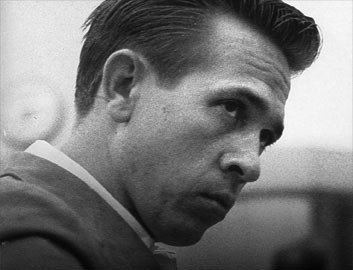Alvis Edgar Owens Jr. was born in Sherman, Texas, on Aug. 12, 1929, and at age 3 or 4 nicknamed himself "Buck" after a mule on the family farm. The family moved west in 1937, settling in Mesa, Ariz., after their trailer hitch broke in Phoenix.
Dropping out of school at 13, he taught himself to play guitar. By 1951, he had moved to Bakersfield, Calif., and eventually found success in its thriving country music scene.
In the clubs of Bakersfield, Owens developed a trademark twisted-note style on his solid body Fender Telecaster. Initially recording as lead guitarist for Tommy Collins in 1953 (on "You Better Not Do That") and then singing for the small Pep and Chesterfield labels, Owens landed on Capitol Records in 1957. When his first single for Capitol fizzled, Owens moved to Puyallup, Wash., (a Tacoma suburb) to pursue a radio career. There he met Don Rich (real name Donald Eugene Ulrich), whose high, nasalized harmony vocals would combine with Owens' singing and chugging 2/4 freight train rhythm to make Owens' recordings distinctive. (Rich remained Owens' charismatic right-hand man until he died in a motorcycle accident in 1974.)
In 1959, Owens hit with a recording of "Second Fiddle" in the Ray Price "shuffle" style. Later that year, the success of "Under Your Spell Again" led Owens to return to Bakersfield and form a band, the Buckaroos. In 1963, his recording of Johnny Russell's "Act Naturally" stayed at No. 1 for four weeks, and "Love's Gonna Live Here" spent 16 weeks atop the charts. Throughout the '60s, his recordings regularly topped the country chart including "My Heart Skips a Beat," "I Don't Care (Just As Long As You Love Me)," "I've Got a Tiger by the Tail," "Before You Go," "Waitin' in Your Welfare Line," "Think of Me," "Open Up Your Heart" and "Where Does the Good Times Go."
Encouraged by his manager, Jack McFadden, Owens began investing in entertainment properties. In 1964, they formed the OMAC booking agency, which eventually handled such clients as Merle Haggard, Joe and Rose Maphis, Wynn Stewart, Freddie Hart and Rose Maddox. In 1967, Owens launched Blue Book Publishing. (He sold the company to Tree in the 1980s, and his catalog is now a part of the giant Sony/ATV firm.) Moreover, Owens began to acquire and develop radio stations. (In 1999, Clear Channel bought his KNIX-FM in Phoenix for $84 million and his jointly-owned KESZ for $58 million.)
Yet another feature of the Owens empire came through Buck Owens Productions, which produced his syndicated television series, The Buck Owens Ranch Show. Starting in 1966, the show was shot in "batches" in Oklahoma City, much as Hee Haw would later be done in Nashville. In all, 78 half-hour color shows were taped, and the show at its peak aired in around 100 markets. Several of these shows are now available on home video, and excerpts from them were used as country music videos in the late 1980s. Owen's top-notch band, The Buckaroos, won CMA's instrumental group of the year awards in 1967 and '68.
Owens teamed with singer/multi-instrumentalist Roy Clark in 1969 to host Hee Haw, originally a show for CBS-TV. CBS dropped it in 1971, but the show continued as a syndicated effort. Besides introducing acts, telling jokes and appearing in skits, Owens and Clark had a "pickin' and grinnin'" spot in each show, and both sang and recorded in the popular Hee Haw Gospel Quartet. Owens withdrew from his Hee Haw hosting duties in 1986 and was never replaced although the show continued into 1994.
With his recording career sagging, Owens was essentially reduced to being a face of Hee Haw until Dwight Yoakam came along in the mid-1980s. Like Owens, Yoakam was passionate about West Coast country music, and he was loud in his praise of the old master. In fact, Yoakam made so much noise -- including making a personal plea to his idol -- that Owens recorded (and made a music video of) "The Streets of Bakersfield" with him. It went No. 1 in 1988, the last time Owens has viewed the chart from that vantage point.
Also in 1988, Owens re-signed to his old label, Capitol Records. That union resulted in two albums and five charted singles, none of which reached the Top 20. However, his "Act Naturally" duet with Ringo Starr did make it to No. 27 in 1989. It was accompanied by an amusing Old West-inspired music video in which Owens' manager, McFadden, played the sheriff and actor Vic Tayback (Mel on TV's Alice) played the bartender.
In 1996, he was elected to both the Country Music Hall of Fame and the Nashville Songwriters Hall of Fame. Earlier that same year, he opened his opulent Crystal Palace in Bakersfield. He died on March 25, 2006.
| Date |
Venue |
City |
State |
Note |
| No Tour Dates Available |
04/03/2006 - Singer Owens honoured at memorial -
Read More
03/28/2006 - Music World Mourns Buck Owens -
Read More
03/27/2006 - Buck Owens 1929-2006 -
Read More
10/28/2005 - Buck Owens:The Pride of Bakersfield -
Read More








 Total Reviews: 10
Total Reviews: 10
















































